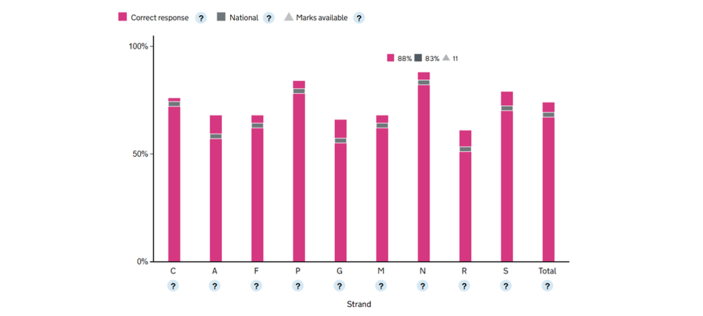External moderation offers a unique insight into the challenges, strengths and evolving practices in Year 6 writing across schools. Each year, I reflect on key themes that have emerged during the moderation cycle. This blog is a round-up of some notable observations and aims to support colleagues as we look ahead to the new writing year.
Whether you're in the Year 6 classroom or lead on English or assessment, I hope these insights provide key reminders and spark useful conversations within your teams.
Let’s start with reflections relating to those pupils still working to secure key, fundamental writing skills and move through to consider all of the standards of the Teacher Assessment Framework.
The Pre-Key Stage Standards may be appropriate for some pupils
When assessment of writing is discussed, there can sometimes be the mistaken shorthand of using the ‘Working Towards the Expected Standard’ (WTS) judgement as a catch-all for any pupil below ‘Working at the Expected Standard’ (EXS) which can lead to some pupils’ writing not being assessed accurately. For pupils who have not fully secured all of the WTS statements, their writing needs to be assessed using the Pre-Key Stage Standards (PKS). We need to be familiar with these standards and recognise when they provide the most appropriate judgement.
PKS-6 aligns with Year 2 EXS, so reviewing exemplification or standardisation materials at this level can be helpful, whilst bearing in mind the need to adjust for the likely increased maturity and content knowledge in older pupils. It is important to remember what writing at EXS for the end of Key-Stage 1 entails: writing will be coherent and clear, sentence structures will be mostly simple, sentence demarcation and past/present tense will be mostly accurate, and simple conjunctions will add detail and interest. Writing that does not meet this standard would need to be assessed using lower PKS standards.
Ensuring there are opportunities for demonstrating security at WTS
When assessing pupils working within WTS it is vital that we have provided sufficient opportunities that allow them to demonstrate what they can do well. Sometimes, for example, pupils lose control of basic sentence structure, punctuation and conjunction use when attempting more ‘advanced’ punctuation and grammar, which can make it harder to establish if they have met all of the WTS ‘pupil can’ statements.
Text type selection plays a role and in creating opportunities for one group of pupils, we must consider how this will work for pupils at different stages of attainment. For example, instructional writing in the spring term can help pupils showcase the WTS-level skills they have secured by this point. However, this genre may potentially limit those working at EXS or ‘Greater Depth’ (GDS), as it doesn't always easily invite the sophistication or higher-level skills that their writing can achieve. To support those more confident writers with these text types, we would need to encourage a broader range of adverbials and sentence structures, helping pupils elevate their writing beyond what they may have produced in earlier years.
Meeting the dialogue ‘pupil can’ statement is more than just ‘speech’
Integrating dialogue into narrative remains a challenging area, even though it has been a focus for several years. To support pupils working at EXS we need to provide meaning-ful opportunities for them to embed dialogue naturally within their writing. When dialogue becomes the sole focus of a task, pupils often overuse it creating extended exchanges that lack narrative purpose. Instead, we should guide them to use dialogue to advance the action and reveal character, ensuring it’s part of a broader, coherent narrative.
Effective integration means embedding speech within description and making it purposeful. Pupils should be encouraged to think about how they report speech - choosing verbs like murmured or mumbled can convey character more subtly than phrases like ‘he said quietly, feeling nervous’. Crucially, dialogue should occur between characters, not just isolated lines or internal monologue, to meet the standard. With clear modelling and thoughtful task design, pupils can learn to use dialogue as a powerful tool in their storytelling.
Description at EXS is more than at WTS
While WTS may require pupils to include description, EXS expects that the description is purposeful, appropiate to the narrative, effective and engaging to the reader. Writing at WTS may have some ambitious words, or interesting adjectives, but that may not meet the EXS ‘pupil can’ statements. Comparing the Dani (WTS) and Morgan (EXS) exemplifications shows this distinction, and the Leigh (high EXS) collection illustrates this even further.
One key shift is moving from simply ‘telling’ to ‘showing’. There are lots of ways this can be taught and encouraged, but a favourite of mine is using drama as a powerful tool for supporting pupils’ understanding - acting out a simple verb like walk, then exploring alternatives like strut, amble, or stumble helps pupils consider how word choice shapes meaning and character. This kind of exploration deepens their understanding of how language can be selected for effect.
Effective description also moves beyond over-reliance on extended noun phrases or strings of adjectives. Instead, it weaves detail into the narrative through action, dialogue and carefully chosen verbs and adverbs. Encouraging pupils to think about how their descriptive choices affect the reader is key to helping them meet and exceed the standard.
Complete and sustained, longer pieces are helpful for demonstrating security at EXS and GDS
When we are planning writing activities for our Year 6 class, it’s vital to ensure we have a range of writing that clearly demonstrates pupils' security with the 'pupil can' statements at both EXS and GDS. While it may seem obvious to say that our stronger writers often produce more writing, it's worth reinforcing that they also need to. Complete and longer pieces provide the necessary space for pupils to build and develop ideas, sustain tone and formality, and show a secure grasp of purpose and audience - elements that shorter writing or excerpts may not fully allow.
That said, shorter forms like letters or speeches can still be highly effective, particularly when it comes to demonstrating understanding of register and formality. Letters or speeches linked to school events, current familiar and understood issues, cross-curricular learning or books pupils have read can offer meaningful contexts that support purposeful writing. These pieces, while more concise, can still showcase a pupil’s ability to adapt tone and language appropriately. However, even in these shorter pieces, it is important that our more confident writers develop and support points they make to ensure that they are demonstrating the TAF requirements.

Spelling evidence should be from everyday writing
As a reminder, Teacher Assessment Guidance (TAG) states that ‘a pupil’s standard in spelling should be evident throughout their writing’ (Section 6.3). Formal spelling tests can support teacher judgements, but they should not replace the evidence found in pupils’ everyday writing. During moderation, we’re not aiming to play ‘word list bingo’, but we do need to see clear evidence that pupils have met the spelling expectations outlined in the ‘pupil can’ statements.
While the statutory word lists may sometimes feel arbitrary, it can be helpful to consider them when planning so that we know there are opportunities for pupils to use them in their writing. Consider how certain words naturally align with specific text types or curriculum topics. For example, words like parliament, language, government, temperature and environment are more likely to appear in non-narrative writing inspired by learning in science or humanities. Others, such as especially, recommend, apparent, communicate and hindrance tend to feature in more formal contexts.
For pupils being assessed against the WTS statements, we look for evidence of spelling from the Year 3 and 4 word lists. These words are more commonly used in everyday writing, but they can still present challenges, especially if pupils have developed incorrect spelling habits or have gaps in their knowledge.
It is also important to remember that teachers must be confident that pupils have met the standards preceding the one at which they are being judged. This means that for a pupil assessed at EXS or GDS, the WTS spelling statements must also be secure. Similarly, the TAG (6.3) reminds us that pupils assessed as WTS should meet the requirements of PK6, which reflects Key Stage 1 spelling expectations and common exception words.
GDS skills need to be taught and given the opportunity to be used
Whilst pretty much all pupils working at GDS are confident, wide-ranging readers, writing at this level typically requires more than absorption of authorial craft from reading alone. We need to ensure that our planning involves explicit teaching about conscious control, what makes writing truly effective and engaging and so on, but also provide ample opportunity for pupils to apply these high-level skills. To write consistently at GDS, pupils need time, space and freedom to produce extended pieces that allow those skills to shine without being overly tied to a ‘model’ text.
For GDS writing, a clear understanding of formality and register - rooted in purpose and genre - is essential. Writing tasks that are domain-specific and demand a formal tone offer ideal opportunities for pupils to use more sophisticated vocabulary, including words from the Year 5 and 6 spelling list.
At the heart of GDS writing is a strong grasp of audience and purpose. Pupils must learn to ask: What do I need to convey, and how can I do so in a way that engages my reader? This is worth keeping in mind if using a writing scheme that is more tied to one model/example or is very sentence-level focussed as this will give pupils less freedom to experiment with their craft.
Published pieces only?
‘Publishing’ pieces can be a valuable opportunity for pupils to take pride in their presentation and write with a clear sense of audience. However, the process can be time-consuming in a world where we are often short on learning and writing time and the act of ‘copying up’ often leads to errors that aren’t present in the final draft - especially when pupils begin to lose interest in a piece they’ve already completed.
It may be more effective to reserve publishing for a few carefully selected pieces across the year, or to ask pupils to copy up only an extract if the aim is to showcase their best handwriting. This approach helps maintain purpose and engagement while still celebrating high-quality work.
As moderators, we do not expect to see only polished, ‘published’ writing. During the professional discussion, teachers will talk us through the evidence used to inform their assessment judgements. Naturally, this includes looking at pupils’ drafts, which are essential for demonstrating independence in meeting the ‘pupil can’ statements.
How are we facilitating effective independent editing?
Becoming a reflective writer with effective editing skills doesn’t happen by chance - it requires explicit teaching. Pupils need to be shown how to review, proofread and revise their writing meaningfully. In the drive to ensure writing is independent, we can sometimes step back too far, leaving pupils to edit without sufficient guidance. This can lead to ineffective editing, or a narrow focus on just one element, such as ‘up-levelling’ vocabulary (which can sometimes have a negative impact on meaning), rather than other areas for review such as sentence structure or the overall impact on the reader.
Independence doesn’t mean working in isolation without prompts or practiced systems. Pupils still benefit from structured support as they develop their editing skills. Early in the year, this might involve more guided approaches to reviewing their writing. As the year progresses and pupils become more confident, teachers can step back gradually while still providing scaffolds such as prompts on the working wall, reminders of editing steps or access to resources like ‘editing stations’ around the classroom. These supports help pupils take ownership of the process while continuing to build effective editing habits.
How are we building teacher confidence in assessing?
As these reflections highlight, it’s essential that Year 6 teachers have a secure understanding of both the Teacher Assessment Framework and the Pre-Key Stage Standards. This depth of knowledge underpins accurate and confident assessment, and both classroom teachers and leaders need to be allocating time to thoroughly familiarise themselves with the documents and what the expectations look like in practice.
While the exemplification materials are non-statutory, they are incredibly useful for clarifying each standard. They support teachers in interpreting the requirements of the standards and provide valuable reference points when making judgements.
Maintaining consistency across schools is also key. Exposure to a wide range of writing beyond our own classes and schemes helps broaden our understanding and sharpens our assessment lens. That’s why robust, collaborative moderation opportunities are so important - they ensure our judgements are aligned and evidence-based.
In moderation clusters, we dedicate time to unpicking standardisation examples together. This shared analysis helps establish a common interpretation of the standards and reinforces key messages before we apply that understanding to the writing teachers bring. This level of rigour, within a supportive and developmental setting, plays a vital role in building teacher confidence and ensuring accuracy in assessment.
This year, in addition to the autumn and summer Year 6 clusters, we have also included some spring ‘check-ins’ in March. Our full programme of clusters for Years 2 to 6 can be found here.
Year 6 teachers may also find the Year 6 Assessment Essentials training useful for building a thorough understanding of Year 6 assessment. This comprises two courses which can be booked separately or as a package for a reduced price.
For more assessment insights and timely information, we run three Primary Assessment Briefing sessions a year.
As always, feel free to get in touch with any questions or thoughts.






